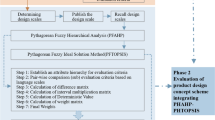Abstract
Under the Ontology-based collaborative design framework constructed by OWL and SWRL, in order to further extend the expression and reasoning abilities of domain knowledge description and to achieve the reasoning based on fuzzy theory, this paper expresses fuzzy domain knowledge by fuzzy logic and realizes the reasoning to make the design process more intelligent. First, fuzzy variables are formed by describing related fuzzy domain concepts and rules in OWL and SWRL. Fuzzy sets which are described by membership functions are then used to define fuzzy variables. At last, the fuzzy knowledge-based collaborative product design is completed by using fuzzy reasoning. A case of die selection shows the feasibility and intelligence of this approach.
Access this chapter
Tax calculation will be finalised at checkout
Purchases are for personal use only
Preview
Unable to display preview. Download preview PDF.
Similar content being viewed by others
References
Studer, R., Benjamins, V.R., Fensel, D.: Knowledge Engineering, Principles and Methods. Data Kn. Eng. 122, 161–197 (1998)
Noy, N.F., Chugh, A., Liu, W., Musen, M.A.: A Frame Work for Ontology Evolution in Collaborative Environments. In: Cruz, I., Decker, S., Allemang, D., Preist, C., Schwabe, D., Mika, P., Uschold, M., Aroyo, L.M. (eds.) ISWC 2006. LNCS, vol. 4273, pp. 544–558. Springer, Heidelberg (2006)
Kim, K.Y., Manley, D.G., Yang, H.: Ontology-based Assembly Design and Information Sharing for Collaborative Product Development. Comput. Aided. Design 38, 1233–1250 (2006)
Dutra, M., FerreiradaSilva, C., Ghodous, P., Goncalves, R.: Using an Inference Engine to Detect Conflicts in Collaborative Design. In: ICE 2008, Lisbon (2008)
Su, T.M., Qiu, X.P., Yu, Y.L.: An Ontology-based Collaborative Design System. In: Luo, Y. (ed.) CDVE 2009. LNCS, vol. 5738, pp. 69–76. Springer, Heidelberg (2009)
OWL Web Ontology Language Guide, http://www.w3.org/TR/owl-guide
Zadeh, L.A.: Fuzzy Sets. Inf. Contr. 8, 338–353 (1965)
SWRL: A Semantic Web Rule Language Combining OWL and RuleML, http://www.w3.org/Submission/2004/SUBM-SWRL-20040521
Author information
Authors and Affiliations
Editor information
Editors and Affiliations
Rights and permissions
Copyright information
© 2010 Springer-Verlag Berlin Heidelberg
About this paper
Cite this paper
Su, T., Qiu, X., Yang, C. (2010). Study of Collaborative Design Based on Fuzzy Theory. In: Luo, Y. (eds) Cooperative Design, Visualization, and Engineering. Lecture Notes in Computer Science, vol 6240. Springer, Berlin, Heidelberg. https://doi.org/10.1007/978-3-642-16066-0_24
Download citation
DOI: https://doi.org/10.1007/978-3-642-16066-0_24
Publisher Name: Springer, Berlin, Heidelberg
Print ISBN: 978-3-642-16065-3
Online ISBN: 978-3-642-16066-0
eBook Packages: Computer ScienceComputer Science (R0)




